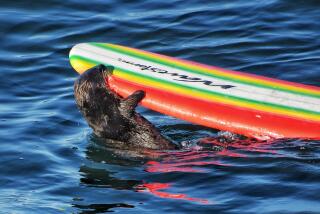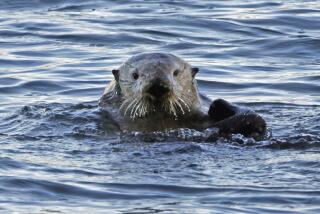Sea Otter Management
- Share via
* Re “Migration of Otters Has Fur Flying,” Sept. 6.
The apparently unresolvable clash between fishermen and sea otters is not served well when terms like “stray” are used to describe an animal seen in an area where it has heretofore not been seen. Only pets and livestock stray.
Emotional arguments aside, there is only one fact that really deserves consideration in this matter, perhaps two.
First, the attempt to “manage” a wild species is pure folly motivated by an understandable desire to maintain a financial status quo; in this case, a false population of shellfish created by the sea otter slaughter of the 19th century.
Second, the loudest voices exhibiting concern for local fish stocks are those very same entities that have traditionally depleted every fishery on the planet. Cases in point: The cod fisheries off Newfoundland and Nova Scotia are economically dead; the sardines in Monterey Bay; the anchovies in Port Hueneme--all commercially gone.
Today, the Pacific salmon fishery is in admitted peril. Strife between commercial fishermen, Native Americans and even between the United States and Canada is rising. Nations describe a $700-million salmon fishery that needs to be fairly divided. My question is: What percentage of the entire salmon population does that sum represent? Cynically, I suspect it represents every salmon that can possibly be taken.
Fishermen pose a greater danger to themselves than could any number of sea otters.
Any attempt to manage sea otters, no matter how well-intentioned or how desperate people are to maintain the status quo, is doomed to failure. Similar attempts to manage wildlife by region have met a miserable and wholly predictable fate in Africa where oftentimes culling becomes necessary; a drastic, dismal, bloody, sad affair.
My modest proposal: Leave the sea otters alone, clean the oceans, tell the Japanese to grow their own sea urchins, and let’s tend to our own numbers before we start managing the numbers of other species.
DANIEL HAYES PEARSON
Oxnard
More to Read
Sign up for The Wild
We’ll help you find the best places to hike, bike and run, as well as the perfect silent spots for meditation and yoga.
You may occasionally receive promotional content from the Los Angeles Times.






